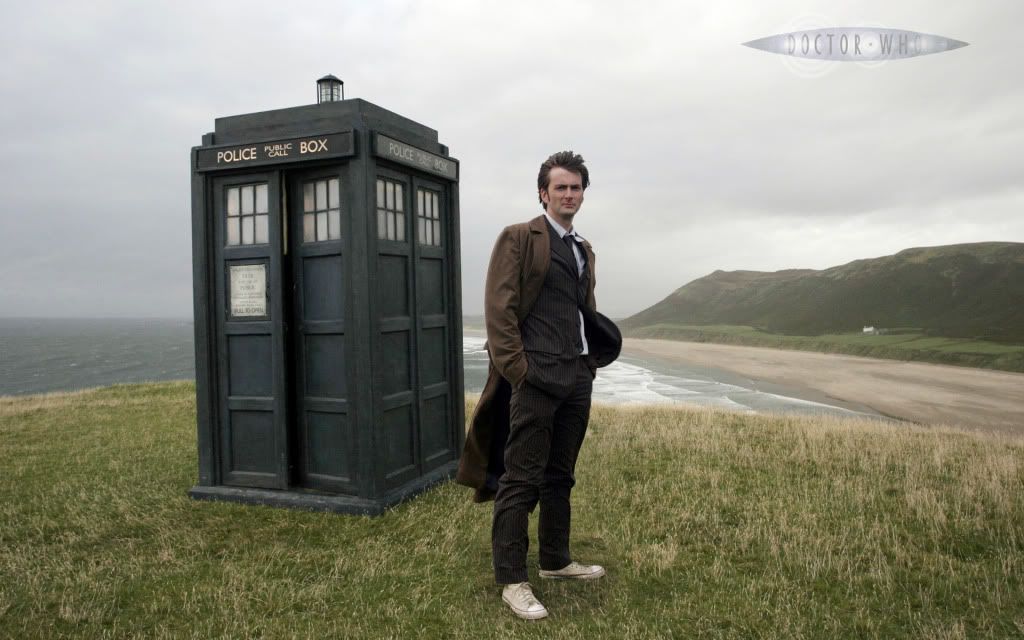 | |
| Doctor/Tardis = OTP |
The internet is chock-a-block with top ten lists of Doctor Who episodes, ranging from "best monsters" to "best use of glasses-porn" to "best cases of the Doctor licking things". But I am a longstanding fan, and I've had a lot of friends, particularly in the US, comment that they've seen and loved Torchwood: Children of Earth, and want to get into the mothershow, but find it completely intimidating to sift through.
So this is my attempt to create a sort of handy guide to the best episodes from the new series for people who have never seen the show. There's a combination of episodes that are there for pure quality and episodes that best introduce the broader mythology of Doctor Who. And even if you never watch another episode of Doctor Who apart from these, you'll know what people are generally referring to, and you'll think the show is bloody brilliant (There are a number of absolutely terrible episodes that make even me embarrassed to watch the show. I am, however, keeping you clear from the really really naff stuff that producers still feel compelled to put in the new series.)
Fair warning: the "Place in the Mythology" subheadings will more than likely contain spoilers.
GIRL IN THE FIREPLACE
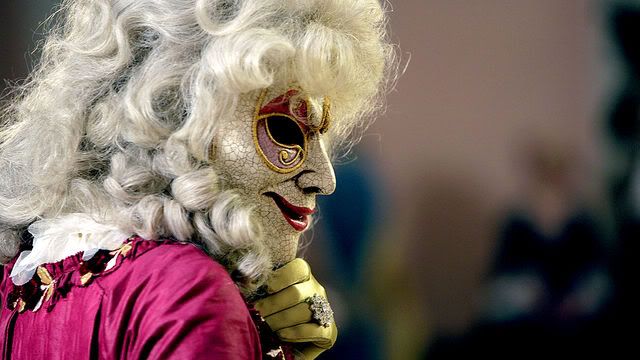 |
| "The clock on the mantle is broken, it is time! Doctor, it is time!" |
For fans of: The Time Traveler's Wife, steampunk, generally beautiful things
Best for: melding history and science fiction together seamlessly
The Story:
Louis XIV's court at Versailles is under attack from sinister alien robots. Louis' lover, Madame de Pompadour, contacts the only man who can help, the mysterious 'fireplace man' that saved her from the same robots when she was a child. The Doctor, who has crossed her fireplace into her boudoir multiple times, answers her call and leaves Rose and Mickey stranded in the 51st century. Who are the robots, and why are they so obsessed with Madame de Pompadour?
Why You Should Watch It:
Casting the impeccably good-looking David Tennant led to a lot of speculation that the Doctor would suddenly become a time-traveling Kirk. And yet, this is the first real romance we see on the show. Madame de Pompadour takes the term 'companion' to its logical conclusion (Aside: Joss Whedon did an interview long, long ago, about why he named the prostitutes on Firefly 'companions' - apparently he got irritated with the subservient, genderless and formless role of companions in classic Who, and wanted to subvert it).
There's no sex in Doctor Who that isn't deeply disguised (at least not until the current Moffatt era), but this episode is the closest we get to a true love affair, and not just with anyone, but with the favoured courtesan of Louis XIV.
Place in the Mythology:
This is a purely standalone episode, it has no link to anything that happens before or after. And yet, it tells us, and his companion at the time, so much about the Doctor, who he is, what he's fighting internally, and what really drives him. He will always save someone in need, even if that means leaving others even MORE at need. He is quick to fall in love, but falling is the furthest he can go. When he gets caught up in the pure joy of some of his adventures, he forgets some of the human costs. Until he doesn't. And that's when you can almost see it in his eyes, a piece of his heart ripped out everytime. Which makes you wonder if eventually, he doesn't let it be ripped out anymore (and in the case of David Tennant's Doctor, this definitely happens at the end of his tenure).
GRIDLOCK
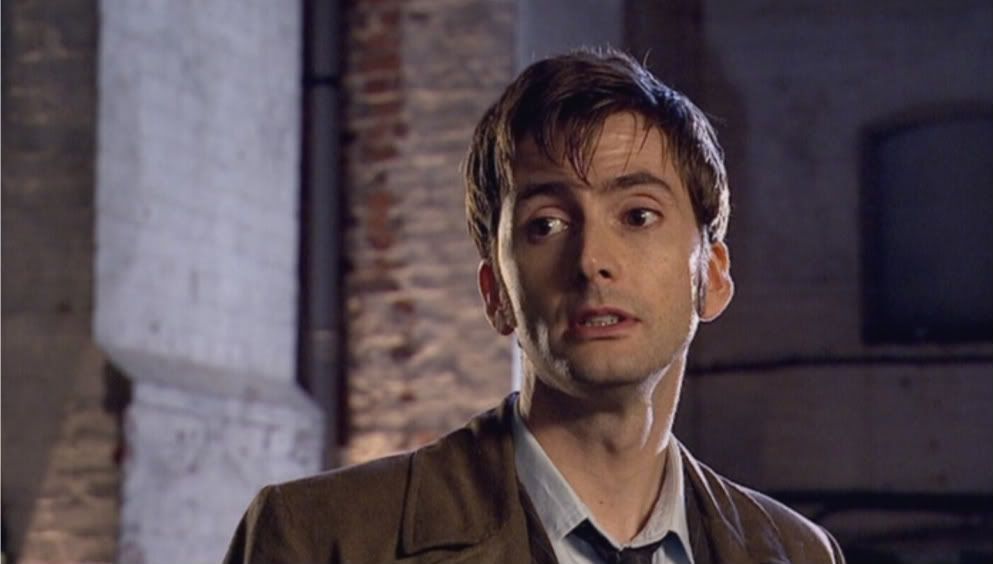 |
| "Everything has its time. And everything ends." |
For fans of: J.G. Ballard, Philip K. Dick, hard sci-fi
Best for: learning why the Doctor has moments where he seems to be suddenly shrouded in darkness.
The Story:
The Doctor takes Martha Jones to Earth's future as a reward for saving his life. When they get there, they find millions of people stuck, quite literally, in traffic gridlock. As the Doctor works to find out what's keeping humanity trapped in their vehicles underground, he meets a rogue's galleries of anthropomorphic cats and squabbling old lesbians. And once he finds out what's at the end of the tunnel, he'll never be the same.
Why You Should Watch It:
It's one of the only new Doctor Who episodes that has a pure sci-fi premise; most Who episodes are more in the "fantasy with future technology" realm. More importantly, we get to see the Doctor open up completely about his past, about his people, about everything he's lost in an honest, emotional way without disaster knocking on the door.
Place in the Mythology:
It has a villain from the old series that even I am not aware of (there are years of episodes that were burned by the BBC during a writers' strike, and are lost to posterity). We get an info-dump about the Doctor's home planet, which establishes the mythology of the new show. Most importantly, we find out what happens to Captain Jack Harkness, esteemed hero of Torchwood (though we won't find out exactly what until much, much later).
SILENCE IN THE LIBRARY/FOREST OF THE DEAD
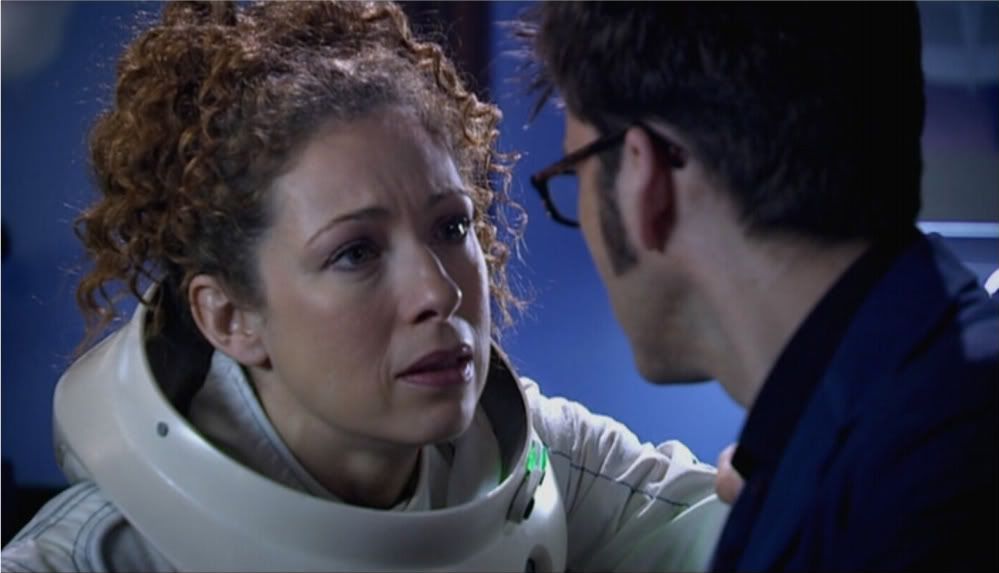 |
| "The Doctor...in the Tardis...next stop everywhere..." |
For fans of: Alien, complicated time travel stories
Best for: Seeing the Doctor evolve before your very eyes.
The Story:
The Doctor receives a message from someone claiming to be a friend, drawing him to what was once the biggest library in the universe. However, when he arrives, he finds that all the patrons had disappeared one hundred years ago, leaving an ominous message to 'count the shadows.' The Doctor is left to solve a number of mysteries: what happened to everyone, what exactly are the flesh-consuming shadows, and most importantly, who is River Song?
Why you should watch it:
It's brilliant, for a start. It's set in a library that has spoilers for everything that ever happens. It's genuinely terrifying in places, both emotionally and physically. It's clever and complicated in a way that longtime fans would not have expected from Doctor Who, and it has an ending that Neil Gaiman would be proud to have written (in fact he has said something to that effect). Nothing happens as predictably as you'd expect. Entire lifetimes come and go, without any magical potion.
It's one of the rare Doctor Who episodes that doesn't undermine the depth and darkness of its story with a cheap happy ending. In fact, even though you're rooting for the Doctor's plan every step of the way, there's a coda that makes you really question whether he saved the day at all.
To say anything more would spoil the experience. This is one of the few episodes that really had me guessing every step of the way.
Also, it has a terrific soundtrack.
Place in the Mythology:
Silence In The Library introduces firecracker archaeologist River Song, who has since become key to the mythology of the series. But owing to the non-linear nature of her story, how and why she's so important remains a mystery.
For the first and probably only time, we see the Doctor genuinely on the back foot, as he struggles with the idea of this woman who will one day be deeply connected to him, and knows more about him than he knows himself. It's particularly touching because we know that David Tennant's Doctor has too much baggage, so much heartbreak and angst, that he couldn't possibly be so at ease with another (human? Timelord? god knows), but you can see the glimmer of hope in his eyes (and the snap of his fingers) when River convinces him that one day that will change.
And I haven't even mentioned Donna's story. Oh god the heartbreak.
DALEK
 |
| "The stuff of nightmares reduced to an exhibit...I'm getting old." |
For fans of: Buffy/Angel (though more Angel)
Best for: introducing the Doctor's tortured past.
The Story:
In the far future, under the harsh Utah desert, billionaire Henry Van Statten maintains a collection of all the alien detritus that has every arrived on earth, including the last of the Dalek kind. As the Daleks destroyed all of the Doctor's people except himself, what will happen in this face-off between the last of the two ancient and mighty species?
Why You Should Watch It:
The Daleks are historically the Doctor's greatest enemy, a bunch of technologically superior neo-fascists. They are the villains that turned the show from a curiosity into must-watch television back in the 1960s, and were generally pretty scary (until all manner of silliness occurred, which the new series is bent on repeating). There's an excellent moment in the original series where the Doctor has the opportunity to stop the Daleks from ever being created, and his failure to act led to countless deaths and extreme devastation later on.
So seeing the Doctor face off one-on-one with the last of the Dalek kind, just as he is the last of his kind, has a beautiful poignance. There is an even lovelier moment in the resolution of the episode which questions the whole nature of predetermination, of revenge, and of forgiveness.
It's important to see this because it is the only Christopher Eccleston episode that has stood the test of time, which is unfortunate because his version of the Doctor really is one of the best but the writers gave him the worst story-lines of the series. Ever. Farting aliens were involved in not one, but THREE episodes.
Place in the Mythology:
Let's face it, where the Daleks are concerned, there is no such thing as mythology, past events, total elimination, or any logical narrative sense. They became too popular so they were hideously overused by pretty much every Doctor Who producer ever. But Dalek aired before the writers managed to ruin the overgrown pepperpots completely (again!).
BLINK
 |
| "The Angels have the phone box...it's my favorite! I've got it on t-shirt." |
For fans of: Greek Mythology
Best for: a beautiful tale of how people on the periphery are affected by the wars of the 'gods'
The Story:
When visiting an old house, Sally Sparrow finds a number of cryptic messages from a man called "The Doctor." Then, when her best friend disappears, she starts to take the the mysterious warnings more seriously. She follows a trail of breadcrumbs spread throughout time, but still doesn't know what to do, except for one piece of advice from the Doctor: 'Whatever you do, don't blink.'
Why You Should Watch It:
In this case it might be fair to confuse causation with correlation; the following year, Carey Mulligan had an Oscar nomination. The episode has the Doctor in it for a very brief time, which perhaps makes it an odd choice for the best intro episode. But Mulligan really sells it as winsome Sally Sparrow, drawn into time travel shenanigans purely by accident.
Again, the balance is pitch perfect between humor and horror, and there are actually moments where I jumped out of my skin. To this day, my grandmother can't look at a statue without a twinge of fear. The beauty of the whole thing is the nature of the threat - when you close your eyes, inanimate objects move to steal your life.
The fact that the Doctor appears so little in the episode, and often only in slight clues or cryptic messages, means that the viewer gets to really understand his approach to and relationship with being a hero; more often than not, he's in the wrong place at the wrong time, but he'll fix the problem, and damn the collateral damage.
Place in the Mythology:
We meet the best modern villains on the show, the Weeping Angels. Part of the beauty of this episode, though, is it's standalone nature; we are privy to an episode of Sally Sparrow's life, not to the Doctor's, which makes a change. We get the start and the finish of her time with the Doctor, which has a closure that few other companions get. (There were numerous rumours that they were going to bring her back full time, but then the Academy rang.)
HUMAN NATURE/FAMILY OF BLOOD
 |
| "He's like fire and ice and rage. He's like the night and the storm in the heart of the sun...And he's wonderful" |
For fans of: Neil Gaiman, especially the darker bits of Sandman.
Best for: Letting the companion shine, seeing what happens if the Doctor is not really the Doctor...
The Story:
In England just before WWI, a teacher named John Smith starts to have strange dreams of travel to far off lands and impossible places. Meanwhile, Martha holds the only key to getting the Doctor back, which becomes increasingly urgent when a menacing family arrives from the stars. Unfortunately, that key is stolen by one of the students...
Why You Should See It:
It is desperately stressful to know that there is a fearsome threat in the town and being able to see a man who looks just like the Doctor but has hidden that side of himself away so completely. We see John Smith live the life the Doctor never can: uncomplicated, simple, committed. There's a great tension between this wonderful love story that we want to see work and our (and Martha's) desperate need to get the Doctor back.
Also, the ending is terrific. It goes to a dark place that the show never had before or since (though Neil Gaiman will hopefully correct that!). There's a Brothers Grimm fairy tale element, which leaves you wondering which part of the Doctor is actually subsumed when he shifts identities: the human or the omnipotent alien?
Place in the Mythology:
We are introduced to a magical plot device known as the "Chameleon Arch," which essentially rewrites every cell of a Timelord into a new species, even replacing real memories with false ones. The original Timelord "essence" is then stored in a key, which always seems to be an old-timey fob watch that the Timelord in questions recognizes, but never opens. The minute we learn about this, we know (though the Doctor doesn't figure it out quite yet), that there might be other Timelords scattered about the Universe, their identities subsumed into a new consciousness, which is how they've managed to survive when the rest of the species died.
Moving on:
Right then, I hope some of you find this helpful! There are a number of other episodes that I considered for this list, but writing this post is already ruining my entire life, so I'll leave you here.
But, if you need some immediate recommendations to follow on, here they are:
 |
| Fires of Pompeii |
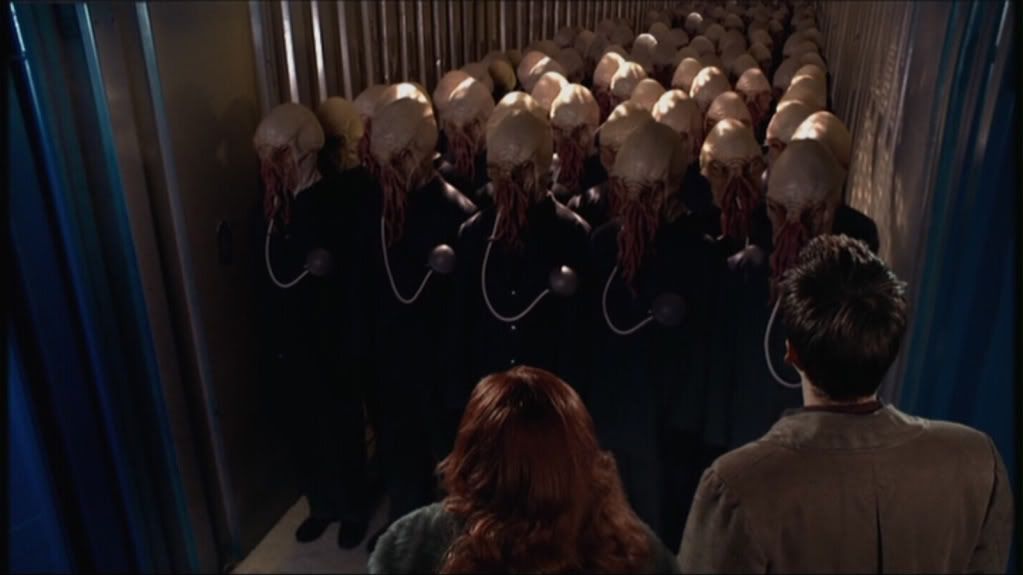 |
| Planet of the Ood |
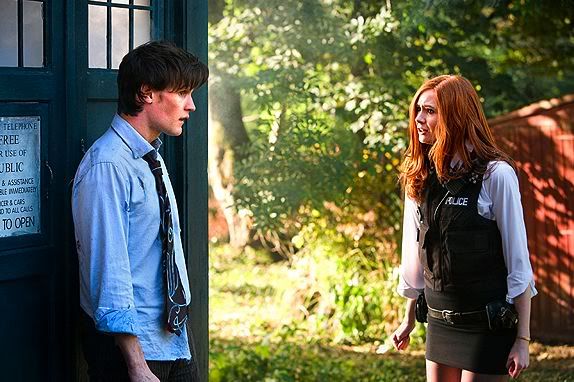
| ||
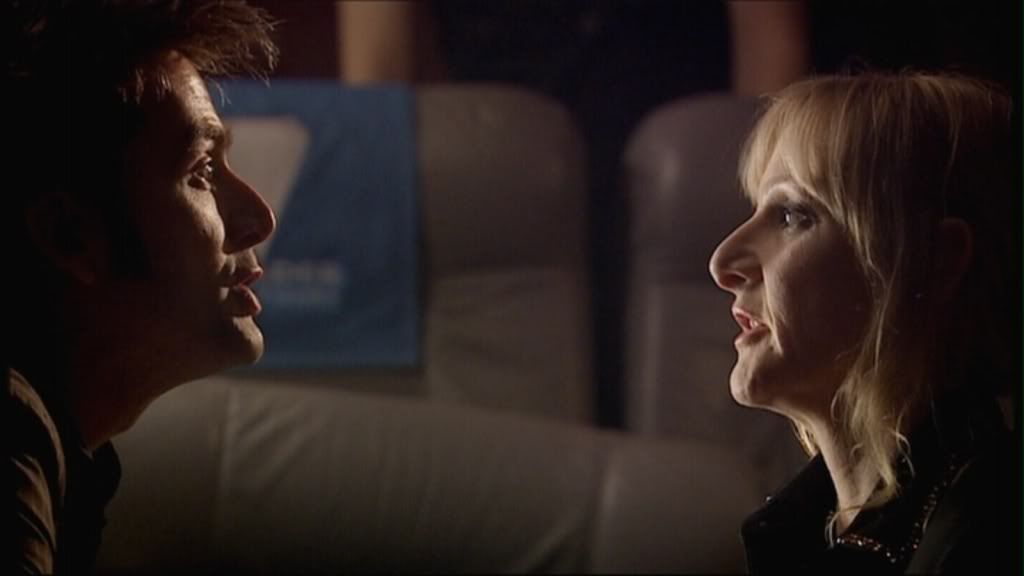
Huh. I remember hating Gridlock, so I only watched it once and now I have almost no memory of what actually happened.
ReplyDeleteI would definitely add The Empty Child/The Doctor Dances to the list, especially if it's primarily for Torchwood fans who'd be interested in Captain Jack's introduction.
That's true! I'll do an update post later. When I can bear to think about Doctor Who again ;)
ReplyDelete